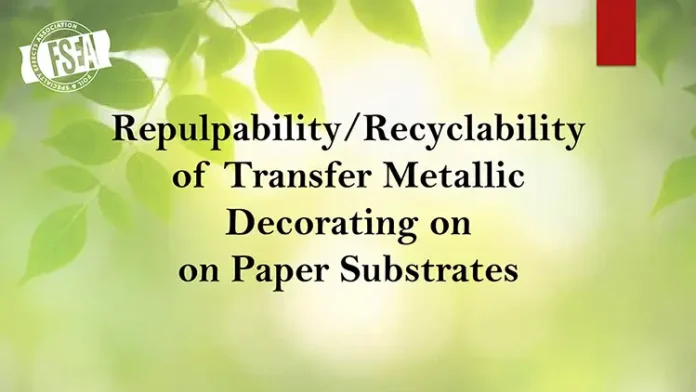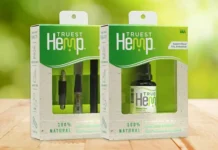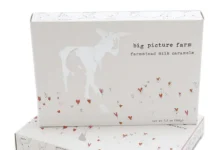By Jeff Peterson, editor-in-chief, PostPress, and FSEA executive director
It’s apparent over the last several years that the focus on sustainability, especially as it relates to packaging, is not going away. Brand owners and consumers are asking questions on what is recyclable or repulpable and what
is not.
Folding cartons and labels containing metallic decoration have been at the forefront of questions, mostly due to their glitz and brilliance, bringing attention to their recyclable contents. With ever-growing attention to this issue, the Foil & Specialty Effects Association (FSEA) established a Sustainability Committee nearly two years ago to focus on specific projects and with goals to help communicate accurate information.
The mission of the FSEA sustainability initiatives is to generate pertinent and accurate information as it pertains to metallic transfer decorating technologies and sustainability and use this information, along with other tools, to educate government entities, environmental agencies, print service providers, converters/OEMs, and brand owners regarding the functional and sustainability benefits of metallic decorating technologies.
Through the work of the Sustainability Committee, FSEA and its partners, several tools and studies have been gathered and created for these purposes. Here is a quick rundown of what now is available through the FSEA website.
FSEA repulping of foil-decorated paper study
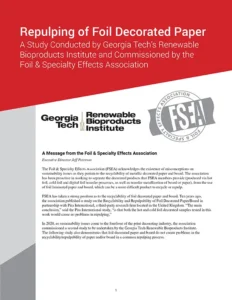
This study, published in 2021, was commissioned by FSEA and conducted by Georgia Tech’s Renewable Bioproducts Institute. The study, available both in print and digitally, discusses the repulpability of paper decorated with transfer metallics, including hot, cold and digital transfer products. It includes the scope of the study, how the experiment was performed, the results from the testing, and final conclusions. The conclusion states that paper stock that includes metallic transfer foil could be repulped to yield 75% fibers with very low rejects. The aluminum content was broken down and removed from fibers during screening, and the hand sheets prepared from the foil-decorated paper stock demonstrated similar physical strength to the recycled paper towel stock without decoration. The final bullet point states that it was feasible to repulp the metallic foil decorated papers as it is done in common recycling settings.
Negligible amount of aluminum contained in metallic transfer foils
FSEA and its Sustainability Committee worked closely with FSEA-member foil manufacturers to collect data and determine the amount of aluminum (metal) used in the manufacturing of transfer metallic foils, including hot, cold and digital transfer foil products. The data confirmed that the layer of aluminum that provides the metallic sheen in a metallic transfer foil is negligible. A press release was created on the subject and included detailed information on the negligible amount of aluminum, siting that the layer of aluminum is less than the thickness of a human hair and is over 300 times thinner than a standard household aluminum foil.
Western Michigan transfer cold foil process testing
Through the sponsorship of FSEA member Eagle Systems, Inc., testing was conducted on the repulpability and recyclability of cold foil decorated paper/board by Western Michigan University. The test results showed that cold foil decorated paper/board is 100% repulpable and recyclable. The cold foil samples used in the testing process were donated by McLean Packaging Corporation, Moorestown, New Jersey. The samples were produced on a thin, 80 lb. litho stock with 100% coverage of cold foil on a 28 x 40″ sheet. The testing also confirmed the extremely small amount of aluminum that exists in cold foil or any decorative transfer foil, which helps negate concerns with metal content in foil-decorated paper/board. To receive a copy of the Western Michigan University test results on cold foil recyclability/repulpability, contact Eagle Systems, Inc. at mking@thefoilexperts.com.
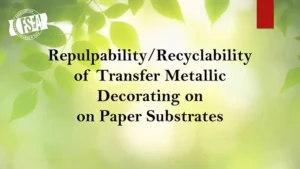
In addition to the studies and testing that FSEA has helped coordinate, the Sustainability Committee has had an impact on published material from other entities involved in sustainability printing and packaging. This included working with the American Forest & Paper Association (AF&PA) to include information on foil-decorated paper in its published Design Guidance for Recyclability of Paper-based Packaging. The report was introduced for members of the paper-based packaging manufacturing supply chain to use in designing and manufacturing packaging to meet customers’ needs in terms of recycling. The new report includes information from FSEA on the repulpability of foil-decorated paper and/or board and provides details on how to access specifically the FSEA study on the repulpability of paper/board decorated with transfer foils.
Recently, through the efforts of its FSEA members and Sustainability Committee, FSEA has been able to provide the Association of Plastic Recyclers (APR), a US-based international nonprofit focused on improving recycling for plastics, detailed information on transfer foil processes, which has led to a decision by APR to declare metallized transfer products in relation to specific coverage guidelines on various filmic label and tube substrates to now be categorized as “APR Design® Guide Preferred.”
All of the above studies and press releases can be found on in the Sustainability/Green Initiative section of the FSEA website at www.fsea.com.
Through the collection of the above studies and tests, FSEA has recently created a presentation to provide a tool for its members and others in the industry and convey the association’s sustainability findings with a consistent message to the print and packaging community. The presentation will be used at specific conferences and events to communicate the sustainability message of transfer metallics and have available for FSEA members to educate customers and internal employees.
Although FSEA is proud of the work of the Sustainability Committee and other FSEA members who have helped in this process, there is still a long way to go. FSEA is working on new studies and tests to help defend the use of metallic decorating processes and is working with specific members on testing decorated paper/board in the recycling process, working with the municipal recycling facilities (MRFs) around the country. FSEA will continue to update members, brand owners and others in the industry as more information becomes available.
A special thank you to the current FSEA Sustainability Committee: Dennis Bacchetta, Diamond Packaging; Mike King, Eagle Systems, Inc.; Karen Kromat, Case Paper; Eric Longnecker, Diamond Packaging; Scott Tacosik, Kurz Transfer Products; Rob Watts, McLean Packaging; and Kennon Woodard, American Greetings.
RadTech Offers Sustainability Information on UV and Electron Beam (EB) Inks and Coatings
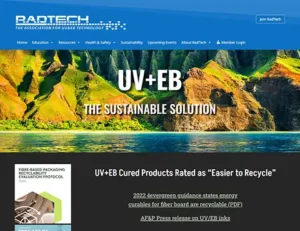 RadTech North America International, the association for Ultraviolet (UV) and Electron Beam (EB) technology, has created a detailed section on its website, www.radtech.org, on sustainability and UV/EB curing for inks and coatings. The page includes recent information on the 2022 4evergreen guidance that states that energy-curable fiberboard is recyclable, as well as a recent press release from the American Forest & Paper Association that states that UV/EB inks do not adversely impact the recyclability of paper substrates.
RadTech North America International, the association for Ultraviolet (UV) and Electron Beam (EB) technology, has created a detailed section on its website, www.radtech.org, on sustainability and UV/EB curing for inks and coatings. The page includes recent information on the 2022 4evergreen guidance that states that energy-curable fiberboard is recyclable, as well as a recent press release from the American Forest & Paper Association that states that UV/EB inks do not adversely impact the recyclability of paper substrates.
The page also includes a link to an article on a study commissioned by RadTech several years ago where both conventional ink systems and UV- and EB-cured inks and coatings were tested in a series of pilot deinking trails. The results indicated that all combinations easily were repulpable within normal operating parameters. This entire article can be found on the RadTech site and also is available on the FSEA Sustainability & Green Initiatives section of the FSEA site, www.fsea.com.

